Poilievre’s Conservatives lead by 13 over Liberals. A deep dive on why more than half of Canadians have a negative impression of Justin Trudeau
November 6, 2023
From October 27 to November 1, 2023, Abacus Data conducted a national survey of 2,220 adults exploring several topics related to Canadian politics and current events as part of our regular national omnibus surveys. This survey was conducted entirely after the carbon tax announcement on Thursday afternoon.
In this report, we share new data on:
- Federal vote intentions with a deeper look at the possible road back for the Liberals.
- Party leader impressions with a deep dive on why more than half of Canadians have a negative view of Justin Trudeau.
- Which party Canadians think will win the next election.
Federal Vote Intention
If an election were held today, 39% of committed voters would vote Conservatives with the Liberals at 26%, the NDP at 18% and the Greens at 5%. The BQ is at 34% in Quebec.

Since our last survey, we see almost no change with the Conservatives and NDP down 1 and the Liberals holding steady at 26%. In fact, since the end of July, vote intentions have changed very little and it appears we have entered a new normal where the Conservatives consistently lead by double digits.

Regionally, the Conservatives are well ahead in western Canada, including in BC. The Conservatives lead by 8 in Atlantic Canada. In Quebec, we find the BQ ahead by 8 with the Conservatives and Liberals statistically tied. This is the first time we have measured the Conservatives numerically ahead of the Liberals in Quebec. Before concluding this is a real shift, we need to see more data but if it is happening, this is a notable change in vote intentions in Quebec.

The only regional brightspot for the Liberals is Ontario, where we have the Liberals trailing by only 4, smaller than it has been in recent surveys.
Demographically, the Conservatives lead across all age groups. They lead by 2 among 18 to 29 year olds, 12 among 30 to 44 year olds, 9 among 45 to 59 year olds and 13 among those aged 60 and over.

Is there a road back for the Liberals?
In this survey, we asked some new questions to try and gauge whether the Liberals could stage a comeback.
First, among those who don’t currently support the Liberals (78% of the electorate), 31% say that there is still a chance they would vote Liberal (representing 24% of the entire electorate). Many of these people either voted Liberal in 2021, currently support the NDP, or are undecided. Among 2021 Liberal voters who don’t currently support the party (8% of the electorate), 2 in 3 say there is still a chance they would vote Liberal.
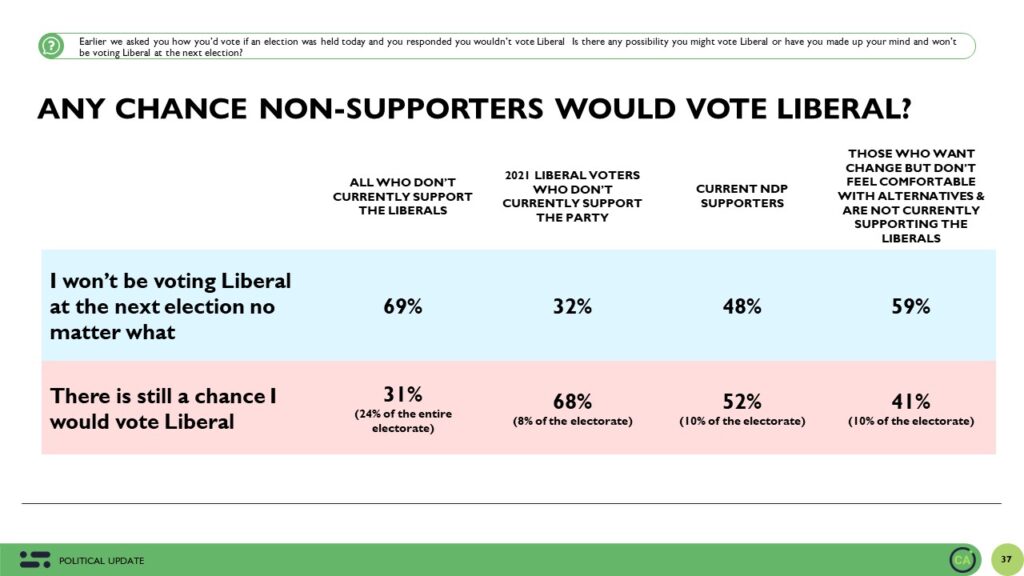
Among those who say there is still a chance they could vote Liberal, 34% are currently supporting the NDP, 21% support the Conservatives, 8% support the BQ and the rest are split between the Greens, People’s Party and other parties. More than 1 in 4 say they are undecided.
What might entice them to vote Liberal?
We asked those who don’t currently support the Liberals whether some outcomes or factors would make them more or less likely to support the Liberals.
- 1 in 3 say they are more likely to vote Liberal if Justin Trudeau was no longer Liberal leader
- 1 in 3 say they would be more likely to vote Liberal if mortgage interests started to drop
- 40% say they would be more likely to vote Liberal if the economy improved
- About 1 in 3 said they would be more likely to vote Liberal if it became clear Pierre Poilievre and the Conservatives were likely to win the next election or if they felt uncomfortable with Pierre Poilievre as Prime Minister.
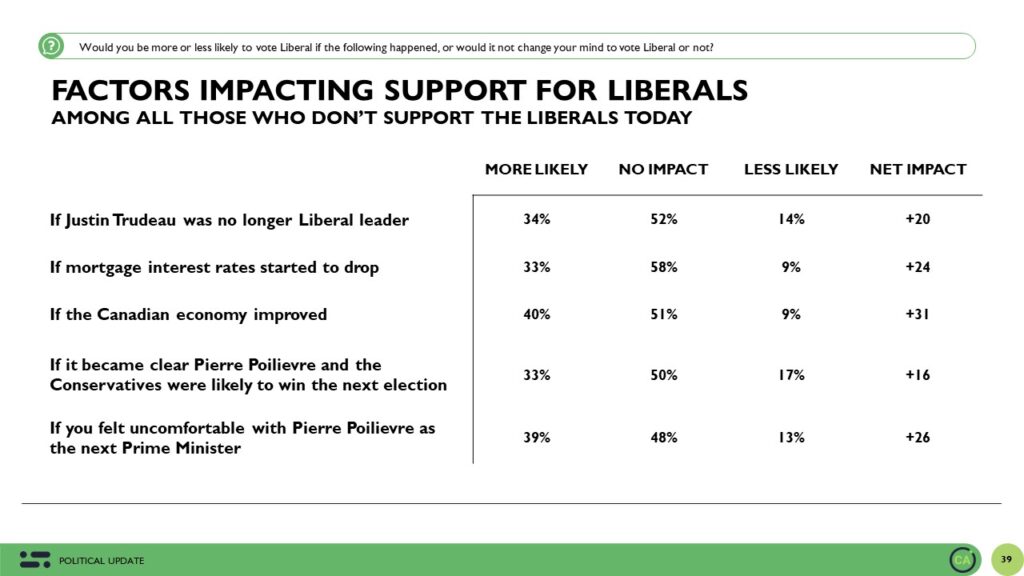
All five outcomes offer the Liberals some hope that they could rebuild their winning coalition, but there’s no clear silver bullet, including the Prime Minister stepping down as leader before the next election. It’s likely a combination of these will need to happen to overcome the desire for change people are feeling.
But digging a bit deeper into these numbers gives us a bit better sense of what might need to happen for the Liberals to find a way back into contention.
When we look specifically at two subgroups – those who currently support the NDP and those who voted Liberal in 2021 but don’t currently support the party (aka the switchers), we find that many of these outcomes, especially the prospect of a Conservative government or improving economic conditions might entice many into the Liberal tent. The fact that the prospect of Trudeau stepping down doesn’t have as strong an appeal might suggest that the Liberal brand is so associated with Trudeau that voters cannot look past it.
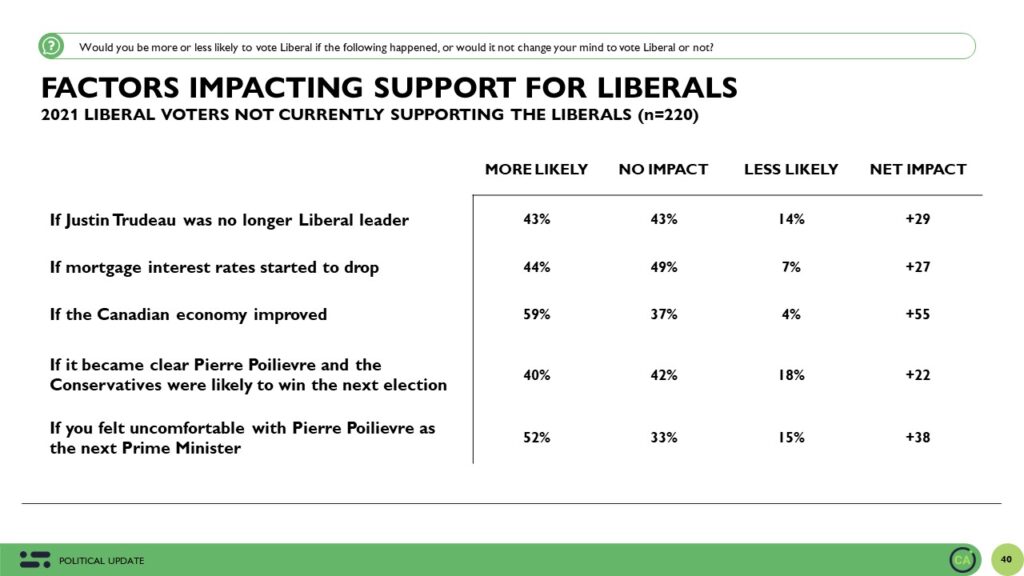
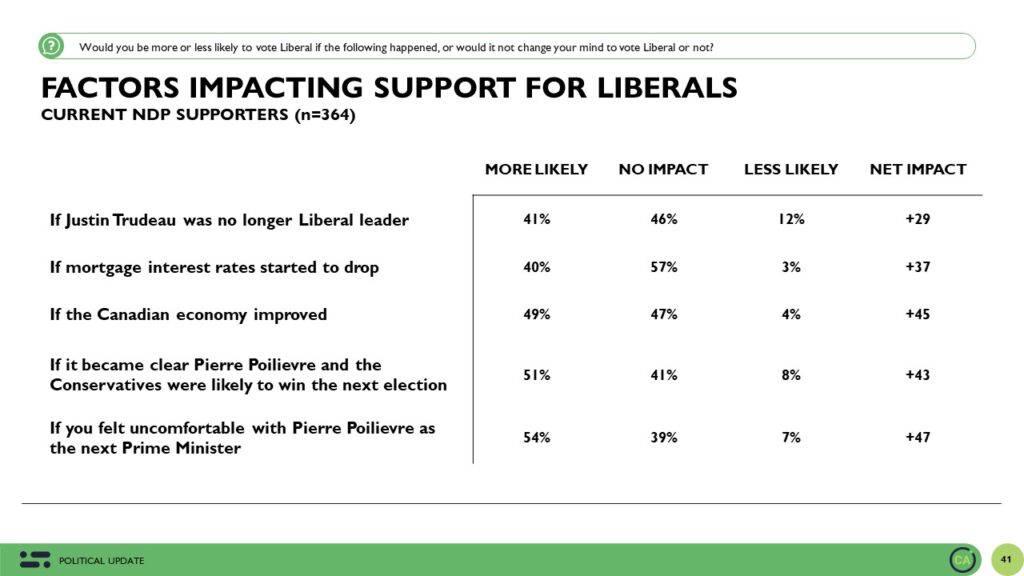
Party Leader Impressions
As usual, we asked Canadians how they feel about the main political party leaders.
Jagmeet Singh has seen a slight rebound in his positives. Today, 37% say they have a positive impression of him compared with 32% who have a negative view for a net favourable of +5.
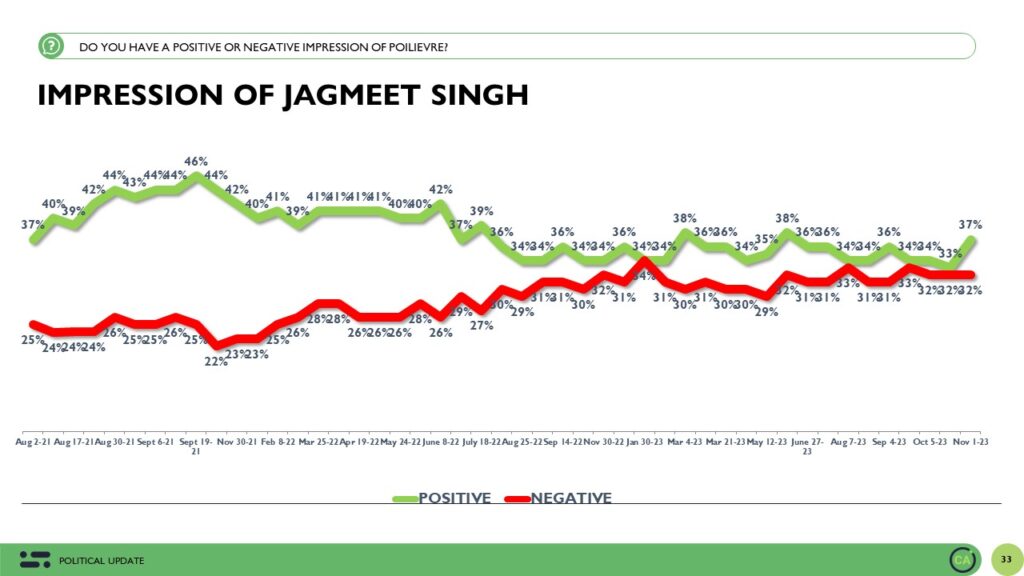
Pierre Poilievre has also seen an improvement in his overall image, rising 4 points since last wave and 5 points since mid-September. Today 40% have a positive view of Mr. Poilievre compared with 32% who have a negative view for a net favourable rating of +8. Pierre Poilievre is now the most popular leader in Canada.
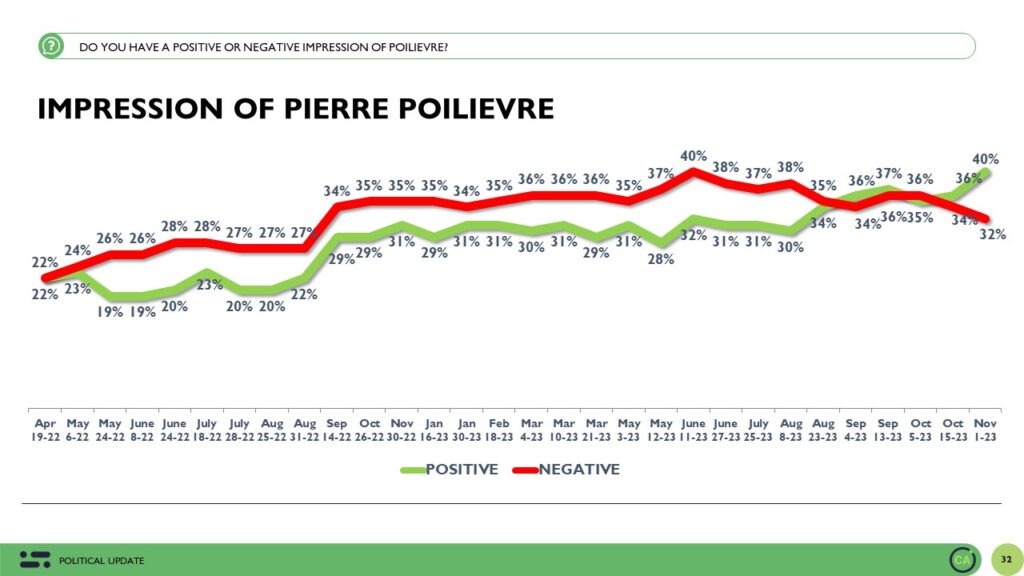
For Prime Minister Trudeau, impressions remain decidedly negative although somewhat less so than a month ago. Today, 29% have a positive view of the Prime Minister compared with 53% who have a negative view for a net favourable impression of -24. The Prime Minister’s negatives are down slightly – from 56% in September to 53% today. Still though, they remain far higher than we saw two years ago around the time the Liberals were re-elected.
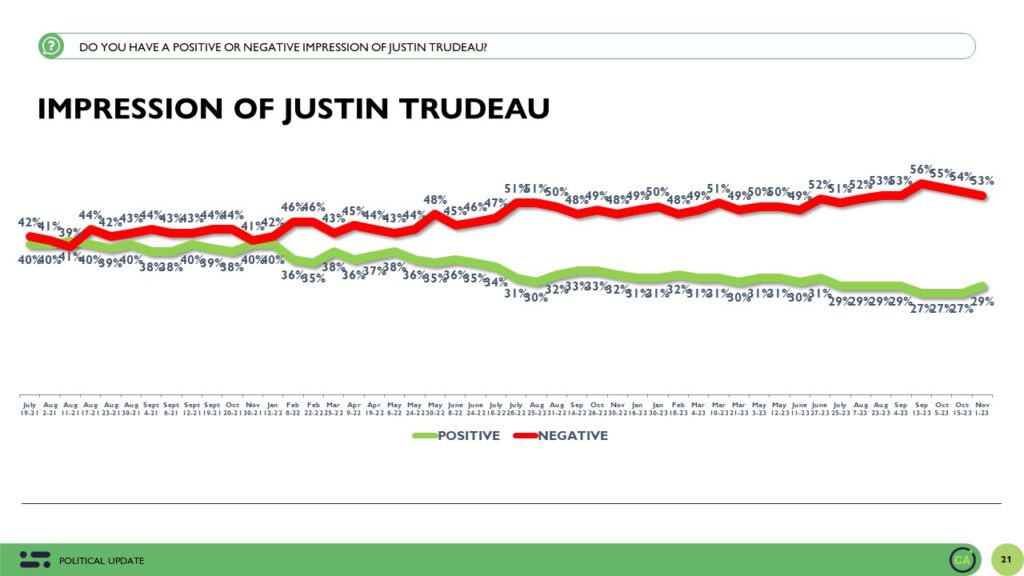
Trudeau’s image is about the same among men and women now and he’s viewed more positively among younger Canadians. Regionally, his net favourable ratings are better in Atlantic Canada, Ontario and Quebec than they are in the West,
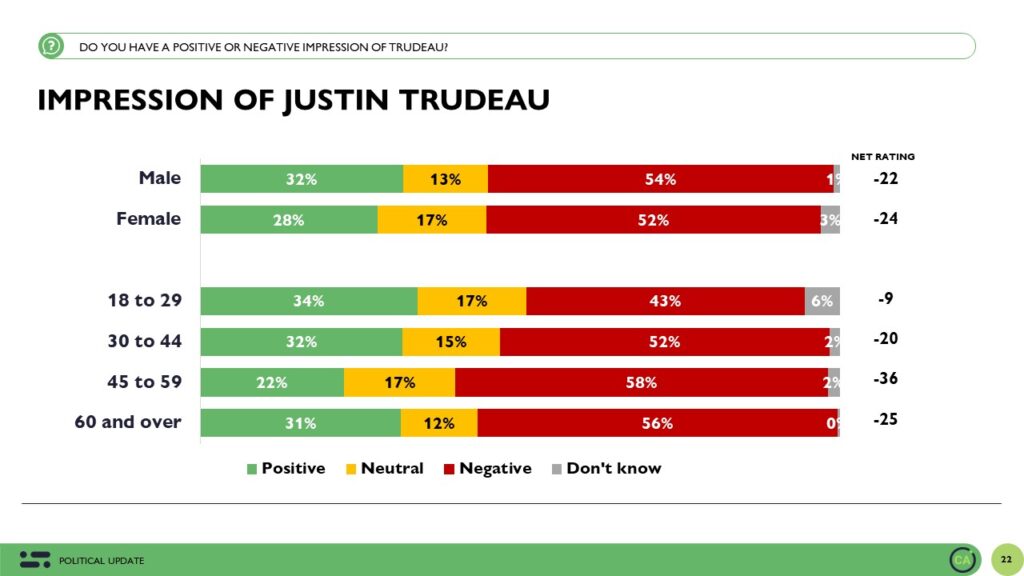
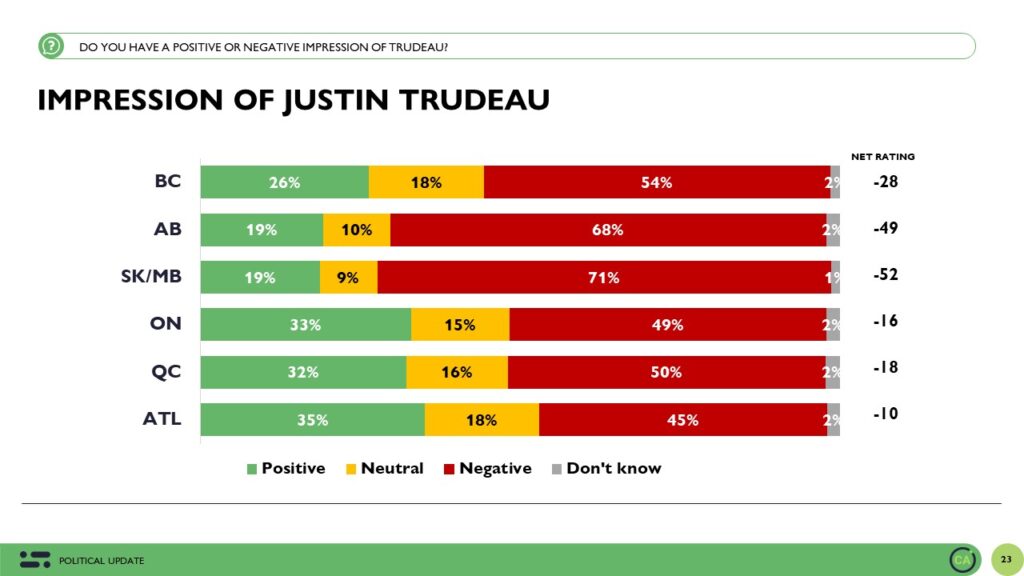
Why does one’s impression of Justin Trudeau matter so much? Because it is highly correlated with vote intention.
- Among those with a positive impression of Trudeau (29%), 64% are voting Liberal, 18% NDP and 7% Conservative.
- Among those with a neutral view of him (15%), 26% are voting Liberal, 22% Conservative with 39% voting NDP.
- Among those with a negative view of him (53%), 63% are voting Conservative, 14% NDP, and 3% Liberal.
If you don’t like Justin Trudeau or say you have a negative impression of him, there’s almost no chance right now that you’re voting Liberal. That’s the strength that leadership plays on the Liberal Party’s brand.
In this survey we also asked only those who said they have a negative impression of the Prime Minister to pick between two descriptors that they feel comes closest to their view. My objective is to try and uncover what it is about the Prime Minister that some don’t like – especially those who voted Liberal in 2021 but today say they don’t like the Prime Minister.
The answers are pretty striking.
For everyone who has a negative view of Justin Trudeau, almost 6 in 10 say they are tired of him rather than not liking him as a person – in other words, 31% of Canadian adults say they have a negative view of the Prime Minister and one of the reasons they do is because they are tired of him. This is sense of fatigue is especially true of those who have a mostly negative view rather than a very negative view of him.
Digging deeper into those who are tired of Trudeau and have a negtive view of him, 11% of them who voted in 2021 voted for the Liberals. Only 9% think the country is headed in the right direction and only 16% would consider voting Liberal at the moment (69% are open to voting Conservative). If an election was today, 62% of these tired of Trudeau detractors would vote Conservative, 17% NDP, 8% BQ, 6% Green and only 3% Liberal.
Half say they think he has lost the passion for the job rather than still wanting the job of Prime Minister.
More than half think he doesn’t listen to good advice rather than he surrounding himself with yes-people.
And more than half feel he’s not trying to change enough about what is wrong with Canada rather than trying to change too much of what makes Canada great.
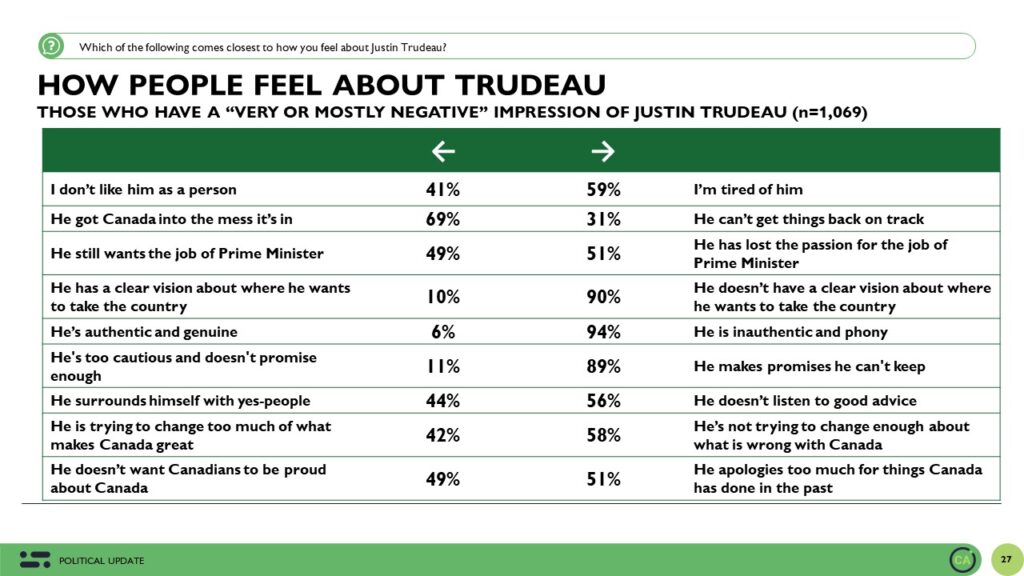
But perhaps most instructive, almost all Trudeau detractors agree that he doesn’t have a clear visision about where he wants to take the country, he is inauthentic and phony, and he makes promises he can’t keep.
The perceived lack of vision, authenticity, and ability or willingness to follow through on promises are fundamental to why more than half of Canadians have a negative view of the Prime Minister. Add to the fact that many are simply tired of him means it is unlikely that he himself can do much in the short term to change these views.
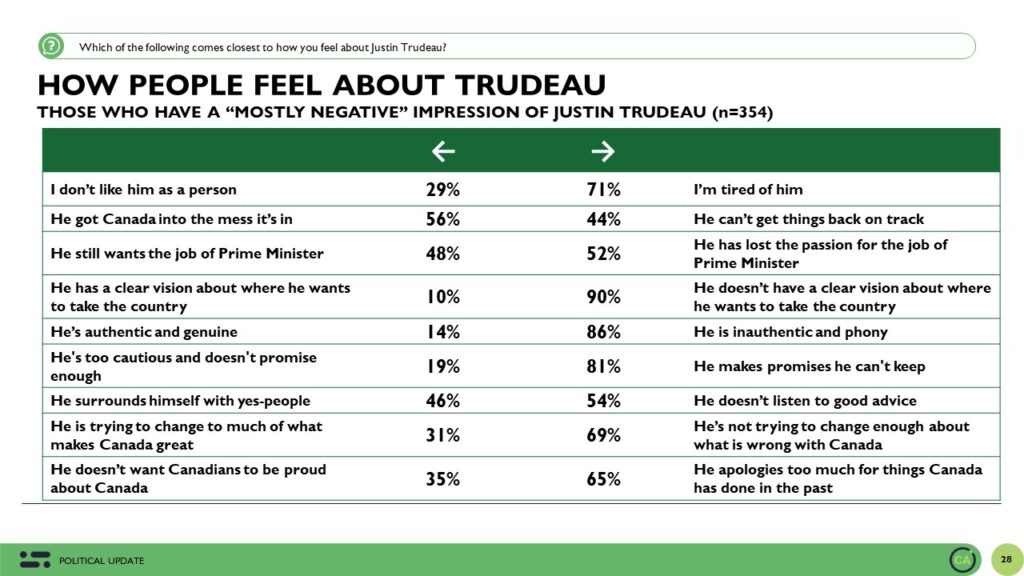
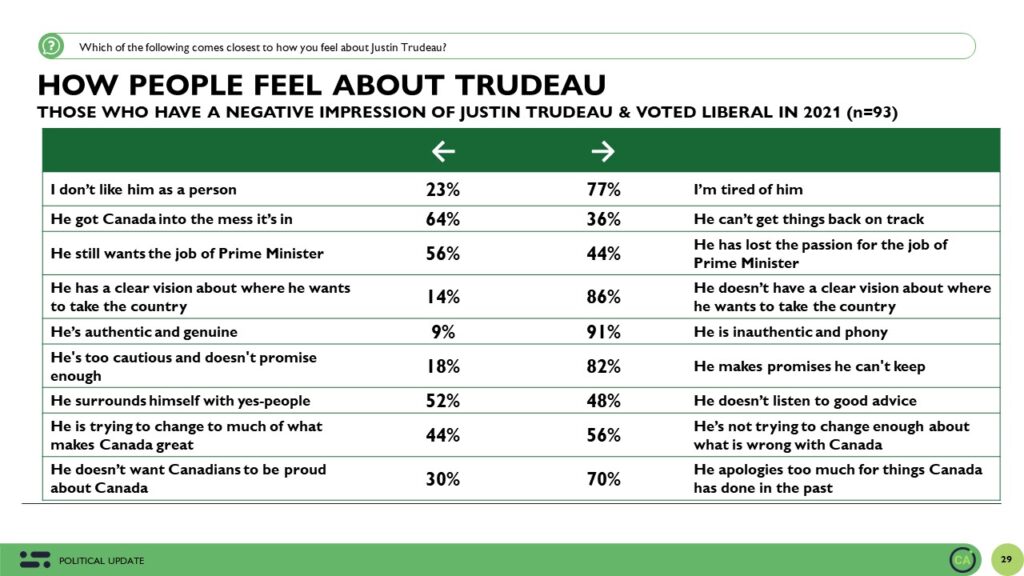
Who will win the next election?
For the first time since the last election, we asked Canadians who they thought would win the next election. By a significant margin, Canadians are far more likely to think the Conservatives will win than the Liberals (43% to 20%). Another 10% think the NDP will win with 28% saying they are undecided.
Among Conservative supporters, almost all (87%) think the Conservatives will win while a majority of Liberal supporters (59%) think the Liberals will win. 14% of Liberal and 16% of NDP supporters think the Conservatives are most likely to win.
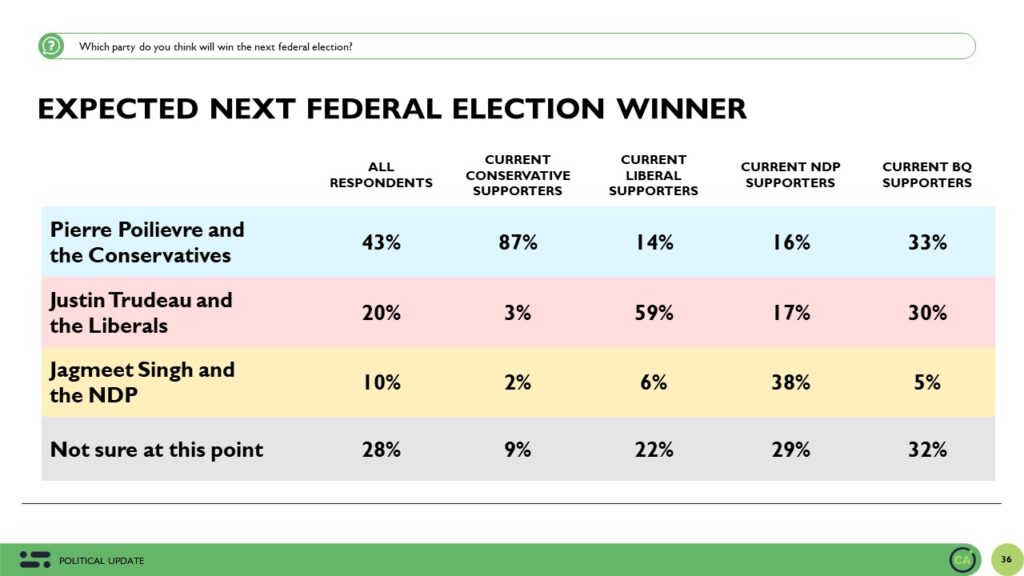
The Upshot
According to Abacus Data CEO David Coletto: “These results suggest that the political opinion environment has solidified to some extent. After more than four years of a fairly competitive environment between the Liberals and Conservatives, we have clearly entered a new phase where the Conservatives have and sustain a sizeable lead over the Liberals.
This lead is built on widespread dissatisfaction with the Liberal government, a broad and deep desire for change, and fairly negative impressions of the Prime Minister along with improving impressions of Conservative Party leader Pierre Poilievre.
Most people who support the Conservartives expect them to win but that view isn’t shared yet among Liberal, NDP, or undecided voters. That factor is important in trying to understand how voters might react and behave if that outcome feels more and more likely to them. Will that encourage strategic voting? Will that push Liberals to seek alternative leadership? Will that increase scrutiny on the Conservatives?
The path back for the Liberal is there but it’s incredibly narrow. Once someone has a negative impression of you, it’s very hard to change that view. Once they decide they are tired of you, they are less likely to listen to what you say and may even discount your arguments simply because they have lost interest, respect, or affection. This is where the Liberals and Justin Trudeau find themselves right now.”
Methodology
The survey was conducted with 2,200 Canadian adults from October 27 to November 1, 2023. A random sample of panelists were invited to complete the survey from a set of partner panels based on the Lucid exchange platform. These partners are typically double opt-in survey panels, blended to manage out potential skews in the data from a single source.
The margin of error for a comparable probability-based random sample of the same size is +/- 2.1%, 19 times out of 20.
The data were weighted according to census data to ensure that the sample matched Canada’s population according to age, gender, educational attainment, and region. Totals may not add up to 100 due to rounding.
This survey was paid for by Abacus Data Inc.
Abacus Data follows the CRIC Public Opinion Research Standards and Disclosure Requirements that can be found here: https://canadianresearchinsightscouncil.ca/standards/
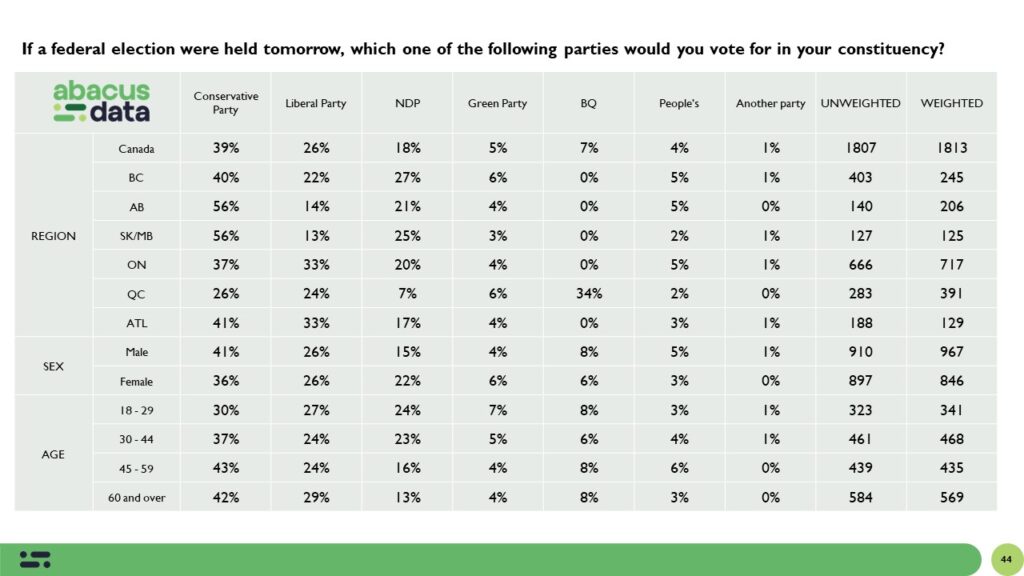
ABOUT ABACUS DATA
We are the only research and strategy firm that helps organizations respond to the disruptive risks and opportunities in a world where demographics and technology are changing more quickly than ever.
We are an innovative, fast-growing public opinion and marketing research consultancy. We use the latest technology, sound science, and deep experience to generate top-flight research-based advice to our clients. We offer global research capacity with a strong focus on customer service, attention to detail, and exceptional value.
We were one of the most accurate pollsters conducting research during the 2021 Canadian election following up on our outstanding record in 2019.
Contact us with any questions.
Find out more about how we can help your organization by downloading our corporate profile and service offering.



